When I sit down to chat to Jane Russell on a Monday afternoon, she has already made 6,500 sausages that day, by hand.
“I didn’t do it on my own,” she laughs, “there was three of us.”
Still that’s a mean feat, especially when you consider that Jane’s method of making sausages is more intensive than most other producers in the country.
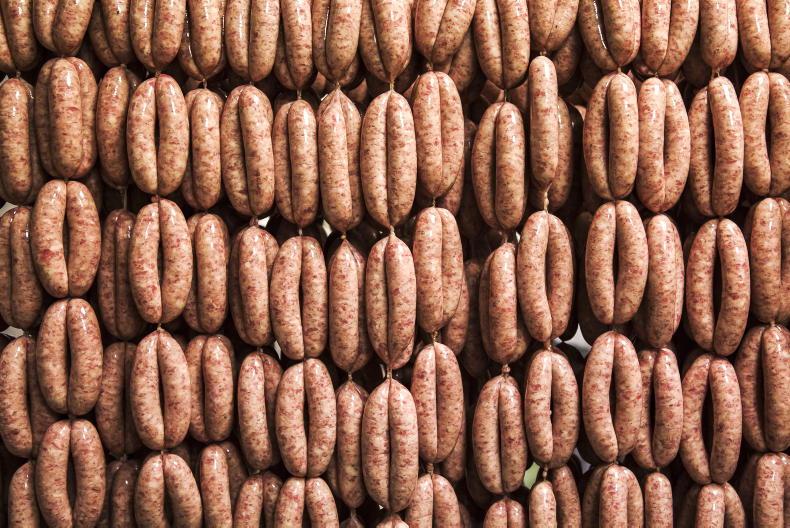
Making sausages in the traditional way, using quality ingredients, has been Jane and her husband Russell’s mantra since they first started the business two decades ago. But this wasn’t Jane’s first foray into sausage making.
“Growing up, my mother’s family ran Burke’s Bacon which was a big business at the time. My mother worked there and it was very much a quality business, they prided themselves on the quality of their sausages. So essentially, I grew up with that, knowing the pride and work that goes into making good food.”
However, Jane had absolutely no intention of working in the food business herself and went off to study engineering “For over two decades I worked in engineering consultancy and design, a career path I really enjoyed.”
High quality
As time went by though, in the back of Jane’s head was this niggling question: what had happened to the Irish sausage?

\ Philip Doyle
“Over the years, the quality deteriorated. Personally, I didn’t enjoy them. They had become too processed, too pink, too smooth, too perfect looking. And there was very little selection, back in the early 2000s, there were no all-meat sausages or flavoured sausages. I thought there was a big gap in the market for a really quality sausage and so Russell and I decided to take the task in hand, quite literally.”
What a huge decision, we remark. “It was alright,” she laughs. “Sometimes I look back and think, ‘my God.’ But I suppose we really just believed that what we were doing was the right thing. It was the food equivalent of, ‘if you build it, they will come’ – that if you create the right product, the market has to be there.”
So from the very start, quality was king. Jane and Russell were determined not to take any shortcuts in creating what is considered one of the best quality sausages in the country.
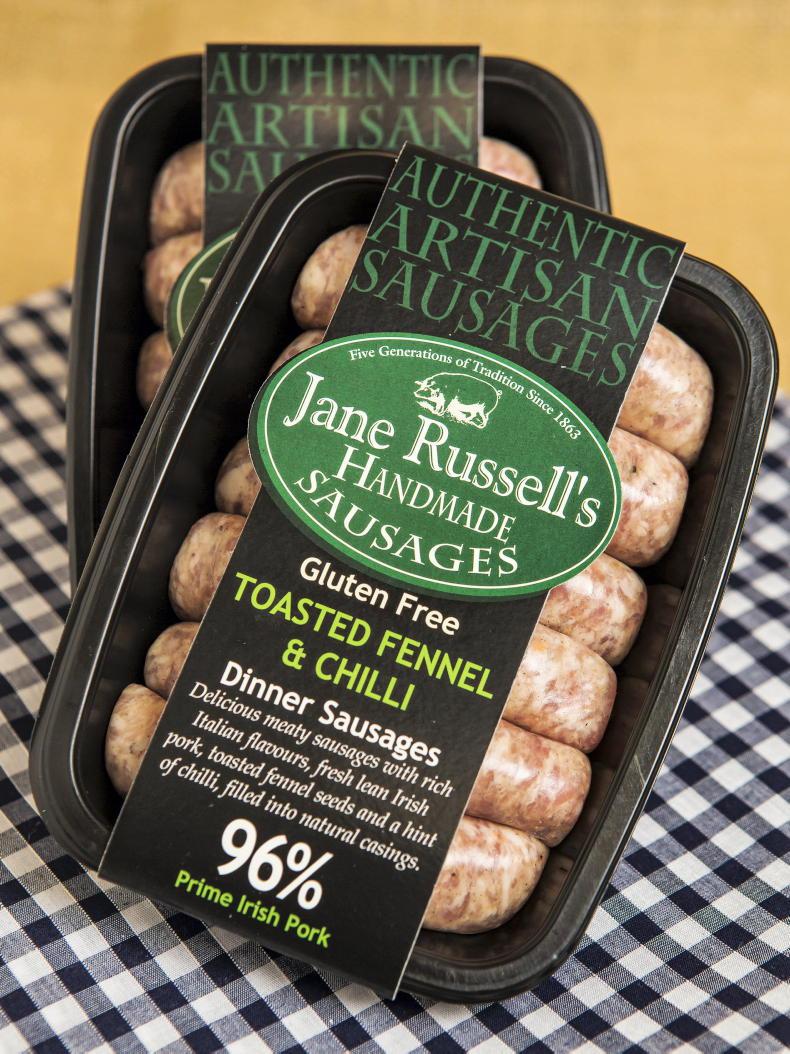
“We made a few key decisions at an early stage and for us, the main thing was the meat. So from the very beginning and to this day, we buy whole pork bellies to make our sausages.
“Prime cuts, no off cuts, we had to ensure what our customers were eating was actually meat. And this is all coming from local pig farmers.”
Best of ingredients
The traditional Irish sausage is their best seller and instead of adding rusk, Jane looked towards a healthy Irish ingredient that served the same purpose: Irish oats.
“We buy pinhead oats from Flahavan’s and we grind them up and add them to the mix. Rusk is just a filler but oats, oats are good for you and give a lovely consistency to the product.”

The main spice for your Irish breakfast sausage is white pepper, but Jane Russell Sausages also uses mace, nutmeg and pimento.\ Philip Doyle
“We also made the decision to avoid nitrates. We wanted to keep our product as natural as possible.

Nitrates serve as a preservative and often companies use them because they have to. But because we are using prime cuts of meat, our product is quite stable, we get a food shelf life and we decided we didn’t need them, which has paid off over the years, as nitrates have gotten more of a bad rep.”
Wrapping it all up is the casing.
“Again, we wanted to do the right thing so we use all natural casings – mostly lamb gut or if we are making more of a chunky sausage for restaurants, sometimes we use pig or hog.”

Everything handmade
This focus on quality continues right through production. “All our sausages are made by hand, which makes it a very labour-intensive process.”
Taking us through her day, Jane explains: “So we started this morning at 7.30am. We inspect every piece of meat, trimming the excess and cutting into pieces small enough for our mincer which isn’t much bigger than the one you would see behind the counter in your local butchers.

Each product in Jane Russell’s range is carefully handmade. \ Philip Doyle
“Once it’s minced, we mix the meat to stretch the protein fibres which encourages it to stick together. You could put it through a machine but we believe our method is far less invasive and it really benefits the texture of the sausage. Then we add in our spices, which we usually mix before the weekend.
“The main spice for your Irish breakfast sausage is white pepper, but we also add some mace, nutmeg and pimento. This might sound exotic, but these are the spices that traditionally every butcher would have added to their sausages and the really good butchers would know their spices well, knowing that if they were running low on mace for example, they would add a little more nutmeg. There is great tradition in that mixing of the spices. At that point, we would also add our oats.”
“Then we have a filler which basically looks like a cylinder with a nozzle. We fill the meat into the natural casing and then we hand link them into sausages. We always hang overnight as this allows the sausage to settle.
“When they’re made, the casings are quite wet so hanging allows them to dry so that we can pack them better the next day. This morning, to make those 6,500 sausages, we used about 250kg of meat.”
Foreign flavours
While the breakfast sausage is their best seller, the Irish diner’s every expanding palette led them in some new directions. Jane explains: “We also have all-meat sausages– dinner sausages you’d call them – with different flavours; toasted fennel and chilli; roast garlic and red wine; pork and leek as well as Bratwurst.”

This was a fun, exciting part of the company’s journey. “When Russell and I travelled abroad, we’d always be looking at what other countries were doing with their sausages and how we could put our own Irish slant on them.
“So for example, the Toulouse sausage which is the classic French sausage was the inspiration behind our roast garlic and red wine sausage. We played around with flavours, and that is something that Russell is really good at, being able to identify that roasting the garlic brings more warmth, or saying you need more pepper here or some star anise there.”

One of their most popular flavours is the fennel and chilli. “That’s our version of a spicy Italian sausage and it has tonnes of fennel. We toast the seeds and grind them and it works fantastic with the chilli which adds a little heat.”
In fact, it’s this sausage meat which has really made an impact in restaurants. “Italian restaurants love it. Sprezzatura which has two locations in Dublin, uses the sausage meat as a base for their ragu and they also make meatballs. Their focus is on Italian food made with quality Irish ingredients and they’ve told us our sausage meat has been a big labour saving for them.”

Jane Russell’s Handmade Sausages are also on the menu in other Dublin restaurants such as l’Gueuleton, Forest Avenue, the Bernard Shaw and Camden Deluxe. And the home cook that’s values a high-quality sausage continues to be a repeat customer.
Online orders
“We’ve gotten great support over the years from local independent retailers such as Swans in Naas, Nolans in Clontarf, Ardkeen in Waterford as well as our local Dunnes Stores.” But the biggest surprise is recent years has been their nationwide online delivery.
“Like so many other businesses, the pandemic changed everything. I never thought we would have an online website. I had seen it work for butchers but I figured that people were getting a selection of meat delivered for their freezer.

“Who will pay the delivery charge and the packaging associated with a chilled product for a few packets of sausages? But of course, the pandemic forced us to get online. And the online customers continue to log on, week after week. We haven’t seen much of a dip since restrictions are lifted and now we’re delivering to customers across the country. It’s been a new exciting element of our business that we have embraced.”
Jane Russell’s Handmade Sausages also embraces tradition with its fresh-blood black pudding and dry-cure rashers | www.janerussells.ie
When I sit down to chat to Jane Russell on a Monday afternoon, she has already made 6,500 sausages that day, by hand.
“I didn’t do it on my own,” she laughs, “there was three of us.”
Still that’s a mean feat, especially when you consider that Jane’s method of making sausages is more intensive than most other producers in the country.

Making sausages in the traditional way, using quality ingredients, has been Jane and her husband Russell’s mantra since they first started the business two decades ago. But this wasn’t Jane’s first foray into sausage making.
“Growing up, my mother’s family ran Burke’s Bacon which was a big business at the time. My mother worked there and it was very much a quality business, they prided themselves on the quality of their sausages. So essentially, I grew up with that, knowing the pride and work that goes into making good food.”
However, Jane had absolutely no intention of working in the food business herself and went off to study engineering “For over two decades I worked in engineering consultancy and design, a career path I really enjoyed.”
High quality
As time went by though, in the back of Jane’s head was this niggling question: what had happened to the Irish sausage?

\ Philip Doyle
“Over the years, the quality deteriorated. Personally, I didn’t enjoy them. They had become too processed, too pink, too smooth, too perfect looking. And there was very little selection, back in the early 2000s, there were no all-meat sausages or flavoured sausages. I thought there was a big gap in the market for a really quality sausage and so Russell and I decided to take the task in hand, quite literally.”
What a huge decision, we remark. “It was alright,” she laughs. “Sometimes I look back and think, ‘my God.’ But I suppose we really just believed that what we were doing was the right thing. It was the food equivalent of, ‘if you build it, they will come’ – that if you create the right product, the market has to be there.”
So from the very start, quality was king. Jane and Russell were determined not to take any shortcuts in creating what is considered one of the best quality sausages in the country.

“We made a few key decisions at an early stage and for us, the main thing was the meat. So from the very beginning and to this day, we buy whole pork bellies to make our sausages.
“Prime cuts, no off cuts, we had to ensure what our customers were eating was actually meat. And this is all coming from local pig farmers.”
Best of ingredients
The traditional Irish sausage is their best seller and instead of adding rusk, Jane looked towards a healthy Irish ingredient that served the same purpose: Irish oats.
“We buy pinhead oats from Flahavan’s and we grind them up and add them to the mix. Rusk is just a filler but oats, oats are good for you and give a lovely consistency to the product.”

The main spice for your Irish breakfast sausage is white pepper, but Jane Russell Sausages also uses mace, nutmeg and pimento.\ Philip Doyle
“We also made the decision to avoid nitrates. We wanted to keep our product as natural as possible.

Nitrates serve as a preservative and often companies use them because they have to. But because we are using prime cuts of meat, our product is quite stable, we get a food shelf life and we decided we didn’t need them, which has paid off over the years, as nitrates have gotten more of a bad rep.”
Wrapping it all up is the casing.
“Again, we wanted to do the right thing so we use all natural casings – mostly lamb gut or if we are making more of a chunky sausage for restaurants, sometimes we use pig or hog.”

Everything handmade
This focus on quality continues right through production. “All our sausages are made by hand, which makes it a very labour-intensive process.”
Taking us through her day, Jane explains: “So we started this morning at 7.30am. We inspect every piece of meat, trimming the excess and cutting into pieces small enough for our mincer which isn’t much bigger than the one you would see behind the counter in your local butchers.

Each product in Jane Russell’s range is carefully handmade. \ Philip Doyle
“Once it’s minced, we mix the meat to stretch the protein fibres which encourages it to stick together. You could put it through a machine but we believe our method is far less invasive and it really benefits the texture of the sausage. Then we add in our spices, which we usually mix before the weekend.
“The main spice for your Irish breakfast sausage is white pepper, but we also add some mace, nutmeg and pimento. This might sound exotic, but these are the spices that traditionally every butcher would have added to their sausages and the really good butchers would know their spices well, knowing that if they were running low on mace for example, they would add a little more nutmeg. There is great tradition in that mixing of the spices. At that point, we would also add our oats.”
“Then we have a filler which basically looks like a cylinder with a nozzle. We fill the meat into the natural casing and then we hand link them into sausages. We always hang overnight as this allows the sausage to settle.
“When they’re made, the casings are quite wet so hanging allows them to dry so that we can pack them better the next day. This morning, to make those 6,500 sausages, we used about 250kg of meat.”
Foreign flavours
While the breakfast sausage is their best seller, the Irish diner’s every expanding palette led them in some new directions. Jane explains: “We also have all-meat sausages– dinner sausages you’d call them – with different flavours; toasted fennel and chilli; roast garlic and red wine; pork and leek as well as Bratwurst.”

This was a fun, exciting part of the company’s journey. “When Russell and I travelled abroad, we’d always be looking at what other countries were doing with their sausages and how we could put our own Irish slant on them.
“So for example, the Toulouse sausage which is the classic French sausage was the inspiration behind our roast garlic and red wine sausage. We played around with flavours, and that is something that Russell is really good at, being able to identify that roasting the garlic brings more warmth, or saying you need more pepper here or some star anise there.”

One of their most popular flavours is the fennel and chilli. “That’s our version of a spicy Italian sausage and it has tonnes of fennel. We toast the seeds and grind them and it works fantastic with the chilli which adds a little heat.”
In fact, it’s this sausage meat which has really made an impact in restaurants. “Italian restaurants love it. Sprezzatura which has two locations in Dublin, uses the sausage meat as a base for their ragu and they also make meatballs. Their focus is on Italian food made with quality Irish ingredients and they’ve told us our sausage meat has been a big labour saving for them.”

Jane Russell’s Handmade Sausages are also on the menu in other Dublin restaurants such as l’Gueuleton, Forest Avenue, the Bernard Shaw and Camden Deluxe. And the home cook that’s values a high-quality sausage continues to be a repeat customer.
Online orders
“We’ve gotten great support over the years from local independent retailers such as Swans in Naas, Nolans in Clontarf, Ardkeen in Waterford as well as our local Dunnes Stores.” But the biggest surprise is recent years has been their nationwide online delivery.
“Like so many other businesses, the pandemic changed everything. I never thought we would have an online website. I had seen it work for butchers but I figured that people were getting a selection of meat delivered for their freezer.

“Who will pay the delivery charge and the packaging associated with a chilled product for a few packets of sausages? But of course, the pandemic forced us to get online. And the online customers continue to log on, week after week. We haven’t seen much of a dip since restrictions are lifted and now we’re delivering to customers across the country. It’s been a new exciting element of our business that we have embraced.”
Jane Russell’s Handmade Sausages also embraces tradition with its fresh-blood black pudding and dry-cure rashers | www.janerussells.ie















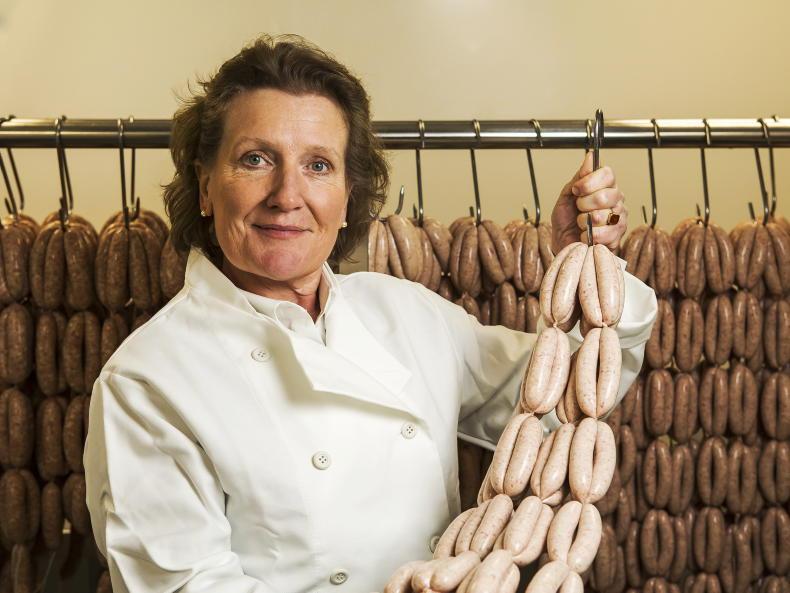
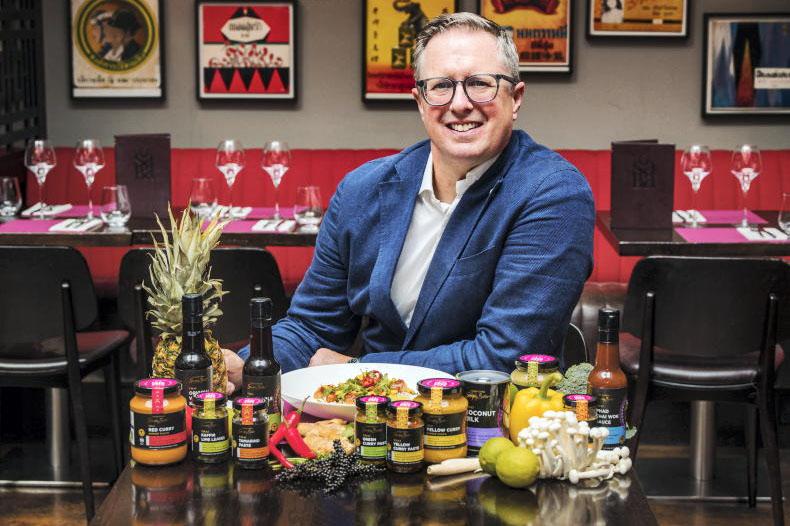
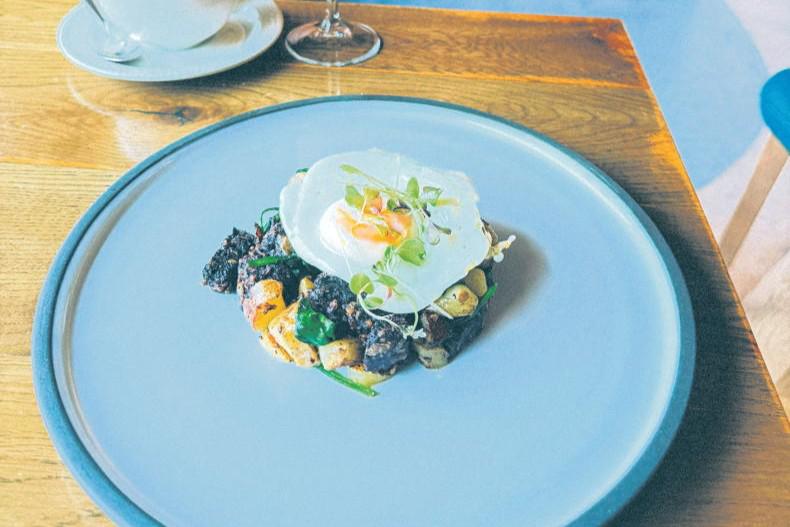


SHARING OPTIONS